Government to mull over global minimum tax proposals in June
The Prime Minister's special working group on Global Minimum Tax (GMT) is set to submit its proposal on the application of the new tax rule in Vietnam to the government this June, said Prof. Nguyen Mai, a member of the taskforce.
The GMT under OECD Pillar Two is a once-in-a-lifetime global tax reform that will apply to multinational companies with revenue above 750 million euros, and many OECD countries are set to implement it at the beginning of 2024.
Prime Minister Pham Minh Chinh established the working group last August, which aims to look at solutions to ensure the country remains attractive to investors while adhering to its international commitments, as well as harmonizing the interests of the government and investors.
Prof. Mai, also chairman of the Vietnam Association of Foreign-Invested Enterprises (VAFIE), told a conference on GMT on Friday that Vietnam needs to quickly implement the GMT so it can tap new opportunities.
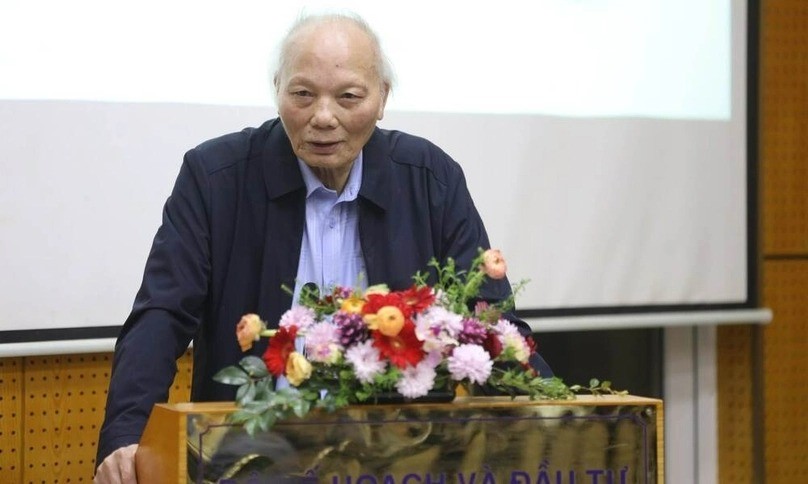
Prof. Nguyen Mai, chairman of the Vietnam Association of Foreign-Invested Enterprises. Photo by The Investor/Trong Hieu.
He described the new global tax reform as an international race because various countries are seeking to attract more FDI, and suggested seven solutions for Vietnam.
The first is to fully study documents of the G7, G20, and OECD related to the GMT, and refer to regulations of some big countries such as India, China, Japan and South Korea, along with ASEAN members, in order to select proper content for Vietnam, then amend its laws on investment, enterprises, and taxation accordingly.
Second, the country needs to review regulations on corporate income tax (CIT) incentives in comparison to the G7, G20, and the OECD to eliminate incompatible regulations.
Third, it is necessary to study and perfect a tax policy for foreign organizations not present in Vietnam but still conducting business and generating income in the country. This is a necessary condition for taxing technology multinationals.
Fourth, it is necessary to renegotiate the Agreement on Avoiding Double Taxation to update and supplement the concepts of permanent establishments in the context of the Fourth Industrial Revolution and the digital economy, and change some relevant content related to the application of the minimum tax regime.
The fifth is to assess the amount of CIT Vietnam would lose to countries or territories where MNCs are headquartered.
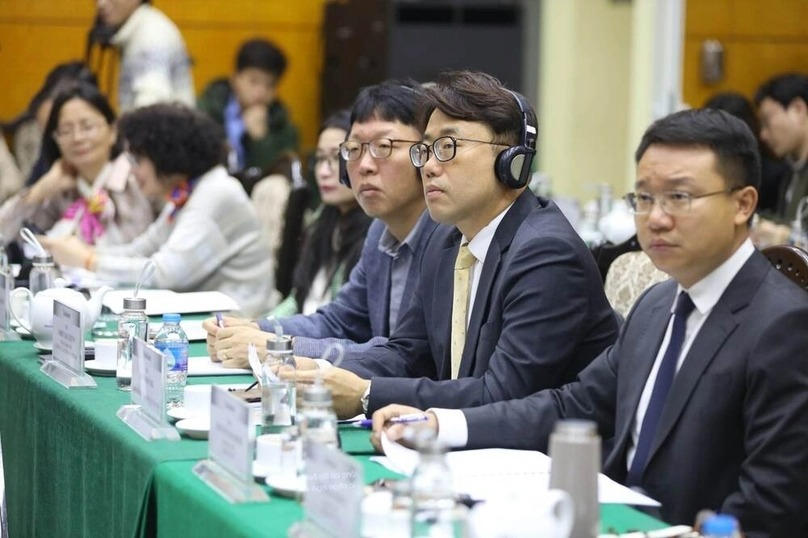
Participants at the Global Minimum Tax conference held by The Investor in Hanoi on February 24, 2023. Photo by The Investor/Trong Hieu.
Sixth, it is necessary to negotiate with each MNC governed by the GMT to agree upon a mutually beneficial solution through policies and mechanisms appropriate to the provisions of UNCTAD, international investment treaties, and new FTAs that Vietnam has joined.
The seventh is to set a time frame to carry out the work related to GMT implementation. Not later than June 30 this year, the working group has to complete its proposals for the Ministry of Finance to submit to the government a plan to amend the Investment Law, the Law on Enterprises, and the Law on Tax Administration, along with decrees, circulars, and regulations.
The government can then submit them to the National Assembly at the year-end session to collect opinions from NA members, vote to approve these amendments, and combine the different laws into one law that should take effect at the beginning of 2024.
The eighth is to speed up the reform of the national administration, including streamlining the State system, simplifying administrative procedures and minimizing bureaucracy, promoting e-government and digital government in investment and business management.
Robert King, Indochina tax leader at EY, said if Vietnam chooses not to introduce legislation to implement Pillar Two of the Global Anti-Base Erosion model rules (GloBE model rules), tax incentives may be “clawed back” in another country, which means investors will not receive tax benefits and will just have to pay tax somewhere else. This raises the policy question of whether Vietnam should adapt its domestic law so that, in these situations, revenue derived in Vietnam is taxed in Vietnam, rather than in another country.
He told the conference that there are a number of ways this could be done. Vietnam could introduce its own form of minimum top-up tax. Another way could be to reduce or modify the tax incentives that are provided such that they are less likely to result in a top-up tax applied under the GloBE model rules. This paper considers the first approach.
However, it is necessary to extend the roadmap for Vietnam to apply GMT, said Do Van Su, deputy director of the Ministry of Planning and Investment's (MPI) foreign investment agency.
“Talks and negotiations between regulators and foreign companies are needed to extend the timeframe by two to five years so that the Government and businesses have more time to prepare,” said the MPI official.
Luu Duc Huy, director of the General Department of Taxation's policy department, said the Ministry of Finance has assistance groups to support the government’s GMT working group. He added that the General Department of Taxation worked with EY in 2022 to get a list of FIEs among 1,015 MNCs with revenue higher than 750 million euro. South Korea will apply GMT in 2024, therefore Korean MNCs among the 1,015 major corporations will be governed by GMT.
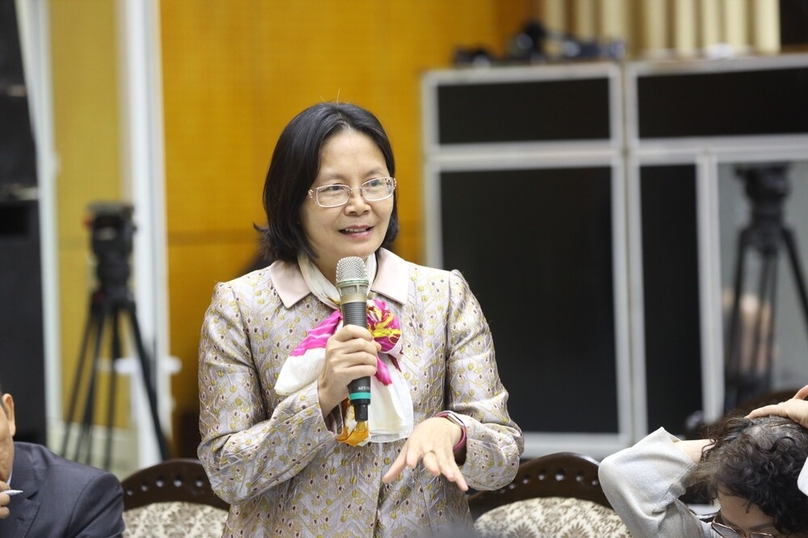
PwC Vietnam general director Dinh Thi Quynh Van. Photo by The Investor/Trong Hieu.
PwC Vietnam general director Dinh Thi Quynh Van said Vietnam should have its own qualified minimum top-up tax (QMTT) mechanism.
She explained that supposed an FIE has five companies in Vietnam that have different CIT rates to pay like 20%, 15%, 10% or others, then Vietnam must set an aggregate level for all five. If the aggregate level is under 15%, Vietnam will have the right to apply GMT, which would be the global norm, she said.
Son Won Sik, a representative of the Korean Chamber of Commerce (Kocham) in Vietnam, recommended Vietnam should work out expenditure-based incentives.
“We recommend that Vietnam should actively promote new incentives such as expenditure-based incentives. This would help to increase the attractiveness of Vietnam as an investment destination, luring “eagles” to Vietnam. Currently, expenditure-based incentives are being applied by many countries,” he said.
Sik noted that incentives based on expenditure can be paid many times, helping businesses to generate revenue from which to pay taxes, and such tax payments will create a cycle to help Vietnam remove financial difficulties.
“Kocham represents Korean companies investing in Vietnam. We recommend Vietnam quickly study this new type of incentives, if necessary laws should be changed this year to ensure the benefits of Korean businesses investing here,” he added.
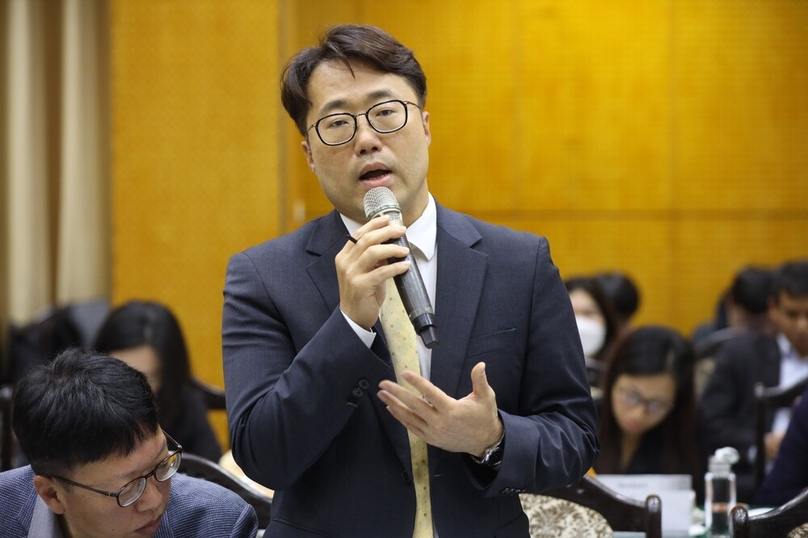
Son Won Sik, a representative of the Korean Chamber of Commerce (Kocham). Photo by The Investor/Trong Hieu.
Choi Sung Ho, chief financial officer of Samsung Electronics Vietnam, urged Vietnam to promptly catch up with the world in GMT implementation. He said Vietnam is already a production base of Samsung, with more than half of Samsung smartphones made in the country.
Choi said Vietnam offers its FDI attraction competitiveness to Samsung but India and Brazil are competing against Vietnam in luring the Korean giant’s investment. When there is no GMT, Vietnam’s competitiveness is higher than in other countries; and when GMT comes, this advantage will no longer exist.
“India has a tax rate of 22% higher than in Vietnam but they have a program to support production and investment. Therefore, Samsung's competitiveness in India is higher than in Vietnam. As a company directly affected by the GMT mechanism, we hope the Vietnamese government will quickly study and make amendments to legalize this year, and so that GMT can be applicable next year,” Choi stressed.
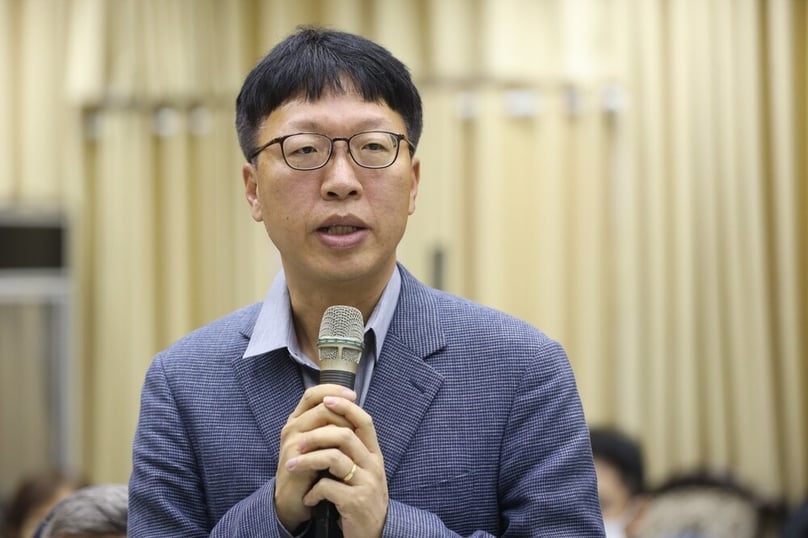
Choi Sung Ho, chief financial officer of Samsung Electronics Vietnam. Photo by The Investor/Trong Hieu.. Photo by The Investor/Trong Hieu.
In reply, Nguyen Quoc Hung, deputy director of the Government Office's international relations department, said the leaders both countries would need to have GMT-related talks.
“GMT is a very big problem. It is difficult to promptly have a solution between now and the end of this year,” Hung said. “As for talks between two deputy prime ministers of Vietnam and South Korea set for March 10, we will propose some solutions and Samsung can join us.”
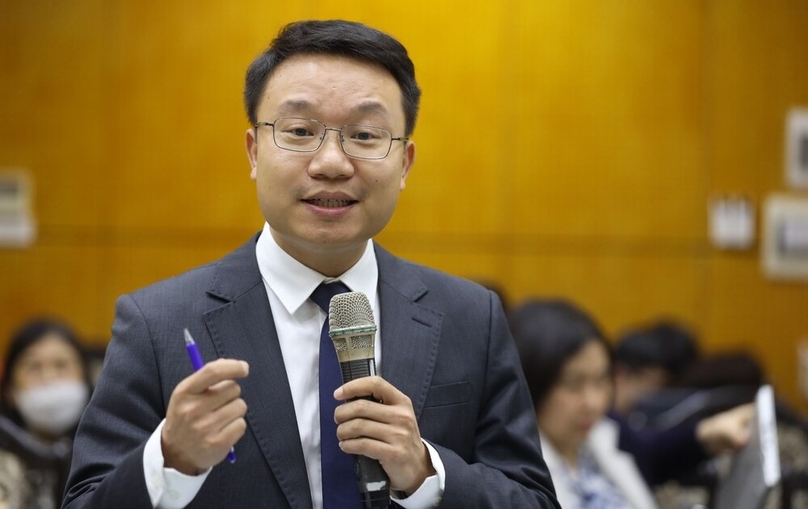
Nguyen Hai Minh, vice chairman of EuroCham Vietnam. Photo by The Investor/Trong Hieu.,
Nguyen Hai Minh, vice chairman of EuroCham Vietnam, said many European investors have suggested expenditure-based incentives for them to move production from China to Vietnam. “Therefore, Vietnam needs to introduce new policies in the next context to maintain its attractiveness as an investment destination,” he said.
“EuroCham quarterly surveys have shown that the factors that European companies care about most are administrative procedures, quality of infrastructure, country entry policy, and green growth, while tax incentives are near the bottom of the list.
“Tax incentives are sometimes not clear enough in Vietnam, while businesses want transparency,” Minh added.
- Read More
Vingroup plans $38 mln bond issuance to restructure debt
Vingroup (HoSE: VIC), Vietnam’s largest listed company by market cap, plans to issue VND1 trillion ($37.91 million) in bonds via private placement as it seeks to restructure debt.
Companies - Tue, November 25, 2025 | 3:52 pm GMT+7
Vietnam gov't proposes minimum $379 mln charter capital for offshore wind developers
The Vietnamese government has proposed that offshore wind power developers have a minimum charter capital of VND10 trillion ($379 million) each, according to a draft resolution designed to ease bottlenecks in the country’s 2026-2030 energy development plan.
Energy - Tue, November 25, 2025 | 3:41 pm GMT+7
Petrovietnam arm to venture into CO2 transportation, seabed minerals, geothermal
PVEP, the upstream arm of state giant Petrovietnam, plans to expand into new fields such as CO2 transportation and disposal (carbon capture, utilization, and storage), coal gas and underground mineral research, seabed minerals, and geothermal.
Industries - Tue, November 25, 2025 | 3:08 pm GMT+7
MB successfully closes landmark $500 mln inaugural green term loan facility agreement
Military Commercial Joint Stock Bank (MB) on Monday announced the successful closing of its three-year $500 million inaugural Green Term Loan Facility Agreement, marking a significant milestone in the bank’s sustainable financing journey.
Banking - Tue, November 25, 2025 | 2:17 pm GMT+7
Impact of rising exchange rates in Vietnam
Mirae Asset Securities analysts offer an insight into the impact of rising exchange rates on companies in Vietnam in a report dated November 21.
Economy - Tue, November 25, 2025 | 1:35 pm GMT+7
Vietnam's industrial park developers post strong earnings as tenant demand rebounds
Vietnam’s industrial real estate sector is showing stronger earnings and improving demand, with foreign tenants resuming lease negotiations after U.S. tariff policies became clearer, according to a brokerage report.
Industrial real estate - Tue, November 25, 2025 | 11:07 am GMT+7
Vietnamese export stocks under the radar despite strong earnings
Investor caution over tariff risks and the slowdown of major economies has prevented Vietnamese export stocks from making a strong price recovery.
Finance - Tue, November 25, 2025 | 8:44 am GMT+7
Indonesia plans 7 initial waste-to-energy plants next year
Indonesia will start the construction of seven waste-to-energy power plants in 2026 as the first step to develop 33 such facilities by 2029.
Southeast Asia - Mon, November 24, 2025 | 9:23 pm GMT+7
Malaysia predicted to be ASEAN’s second-fastest-growing economy, after Vietnam
Malaysia is poised to become the second-fastest-growing economy in the Association of Southeast Asian Nations (ASEAN) after Vietnam, data showed.
Southeast Asia - Mon, November 24, 2025 | 9:19 pm GMT+7
Thailand SCG-backed Bien Hoa Packaging plans delisting from HCMC bourse
Bien Hoa Packaging JSC, a 57-year-old manufacturer in Vietnam, plans to scrap its public-company status and delist from the Ho Chi Minh Stock Exchange (HoSE) as its free float fell below the minimum threshold under local securities law.
Companies - Mon, November 24, 2025 | 9:06 pm GMT+7
Real estate, industrials sectors lead in October M&A value in Vietnam
Grant Thornton analysts provide an insight to capital flows, the sectors attracting investor attention, and the market dynamics influencing the merger and acquisition (M&A) landscape in Vietnam in October.
Economy - Mon, November 24, 2025 | 4:39 pm GMT+7
Tobacco giant Vinataba to sell entire stake in instant noodle maker Colusa-Miliket
State-owned Vietnam National Tobacco Corporation (Vinataba) plans to divest its entire 20% stake in Colusa-Miliket, the company behind the iconic “Miliket” (two-shrimp) instant noodle brand, seeking to raise at least VND114 billion ($4.32 million).
Companies - Mon, November 24, 2025 | 4:10 pm GMT+7
VinSpeed cannot participate in North-South high-speed rail project under PPP model: exec
Pham Nhat Vuong, founder of VinSpeed High-Speed Rail Investment and Development JSC, has mapped out a clear 30-year financing plan for the gigantic North-South high-speed rail project, said an executive at Vingroup, a VinSpeed investor.
Infrastructure - Mon, November 24, 2025 | 3:51 pm GMT+7
Delivery major Viettel Post plans $21 mln logistics center in central Vietnam
Viettel Post, the courier arm of military-run telecom giant Viettel, has completed a site survey for a planned 21-hectare logistics center in the central province of Ha Tinh, with an estimated investment of nearly VND550 billion ($20.87 million).
Industries - Mon, November 24, 2025 | 11:49 am GMT+7
Honda Mobilityland eyes 600-ha sports, entertainment, tourism complex in southern Vietnam
Honda Mobilityland Corporation, a subsidiary of Japan’s Honda Motor Co., plans to build an international circuit in Tay Ninh province, towards developing a 600-hectare sports, entertainment, and tourism complex there.
Industries - Mon, November 24, 2025 | 11:23 am GMT+7
State-controlled shipping line Vosco steps up coal trading to seek new revenue drive
Vietnam Ocean Shipping JSC (Vosco), controlled by the state-run Vietnam Maritime Corporation, is moving deeper into coal trading as the shipping line increasingly bids for large import contracts for thermal power plants, marking a push beyond its core maritime transport business.
Companies - Mon, November 24, 2025 | 8:36 am GMT+7


























